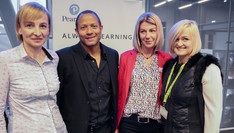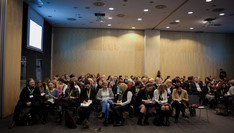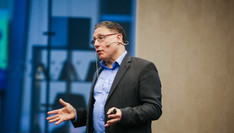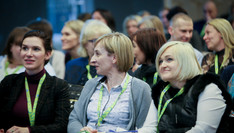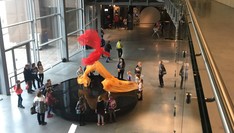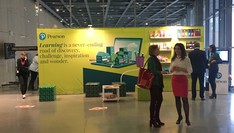The conference entitled ‘Shaping the Future of Learning’ was held on 23 March 2018 at the Copernicus Science Centre in Warsaw.
The welcome address was delivered by Professor Łukasz A. Turski, Chairman of the Copernicus Science Centre. He talked about the significance of the Centre as a cultural and educational institution, and about how the process of education has changed over the years. In the past we only acquired knowledge at schools writing tests and taking exams. Today the approach is more towards discovering things ourselves, which experts refer to as informal learning or enquiry-based learning. The idea of modern education is that every child has its own talent, we just need to discover this talent and prepare him/her for the challenge our civilisation is facing. We, teachers, should encourage them to be discoverers, not to be afraid of asking questions or making mistakes, keep checking and testing for themselves. This is what they do at Copernicus – help to develop traits of a discoverer.

Evan Frendo
The first of the keynote speakers was Evan Frendo, a British freelance trainer, teacher trainer and author. He specialises in Business English and English for Specific Purposes mostly in the corporate sector. At the beginning of his talk entitled ‘Teaching English for the international workplace: meeting the challenges’, Evan Frendo gave a comprehensive overview of business coursebooks that have been in use since 1970s and thus illustrated how the approach to teaching the English language has changed over the years. Business English was distinguished from general English in the late 1960s and early 1970s. Specialist vocabulary was determined and business words included in language learning courses. Authors of the 20th century coursebooks employed methodology which would focus on learning or understanding the concept the learner has to reach. The learner himself was not at the centre, acquiring detailed knowledge was important. That has changed and the approaches later adopted focus more on the need to develop the skill for using the language that the student has learnt. A great part of Evan Frendo’s talk was devoted to ELF (English used as a lingua franca) which does not have to be the same as ENL (English as a native language). Today educators stress the need to adopt the speaker’s level of English with their interlocutors in order to ensure successful communication. Accuracy and fluency of a native speaker is no longer advisable.

JJ Amaworo Wilson
JJ Amaworo Wilson based his lecture on his novel entitled ‘Damnificados’ which was inspired by real events and which pertains to the construction of a huge skyscraper in Caracas in Venezuela. Unfortunately, when the crisis hit the country, construction works on the tower were stopped and the uncompleted building became shelter to the homeless and disadvantaged. They managed to install electricity and running water, they ran their own businesses, provided services and created successful community. None of that would have been possible without seven important factors: self-motivation, creativity, collaboration, persistence, goals, transformation and community. These are propellants for human activity and can be successfully applied to improve teaching and learning quality. Self-motivation – no methods will work unless students buy into them and no longer can we learn a language which is separate from emotion. Creativity – the teacher has to use engaging methods to enthuse their learners: ‘What we learn with pleasure we will never forget’. Persistence – ‘Try again, fail again, fail better’ (Samuel Beckett). Transformation – transform verbal to visual to kinaesthetic, writing to speaking, speaking to writing drawing to speaking (all of these followed by exemplary language activities)

dr Joanna Heidtman
The third lecture was entitled Communication, motivation, development – diversity of styles as the key to efficiency and delivered by dr Joanna Heidtman. The subject was diversity in communication and cooperation. This notion involves personal and professional efficiency. What happens when we make use of our natural strengths and manage our own energy, stress, personal and business relationships in a correct way? How the behaviour and communication style determines our strategies of achieving efficiency, making and maintaining relationships and motivation, as well as coping with stress. Each participant had an opportunity to take a closer look at own strengths and motivations to act and to better understand challenges and difficulties resulting from cooperation and communication with people presenting different styles of action. The knowledge and type of inspiration may be used successfully in team and business management, in relations with clients, as well as in communication and cooperation with co-workers. The lecture was planned to be interactive (elements of interaction with the audience), so that the participants could feel actual involvement, reference to their personal and professional patterns, as well as engagement.
Katarzyna Kania, Barbara Oleksiewicz




